How to keep fruit and vegetables fresher for longer
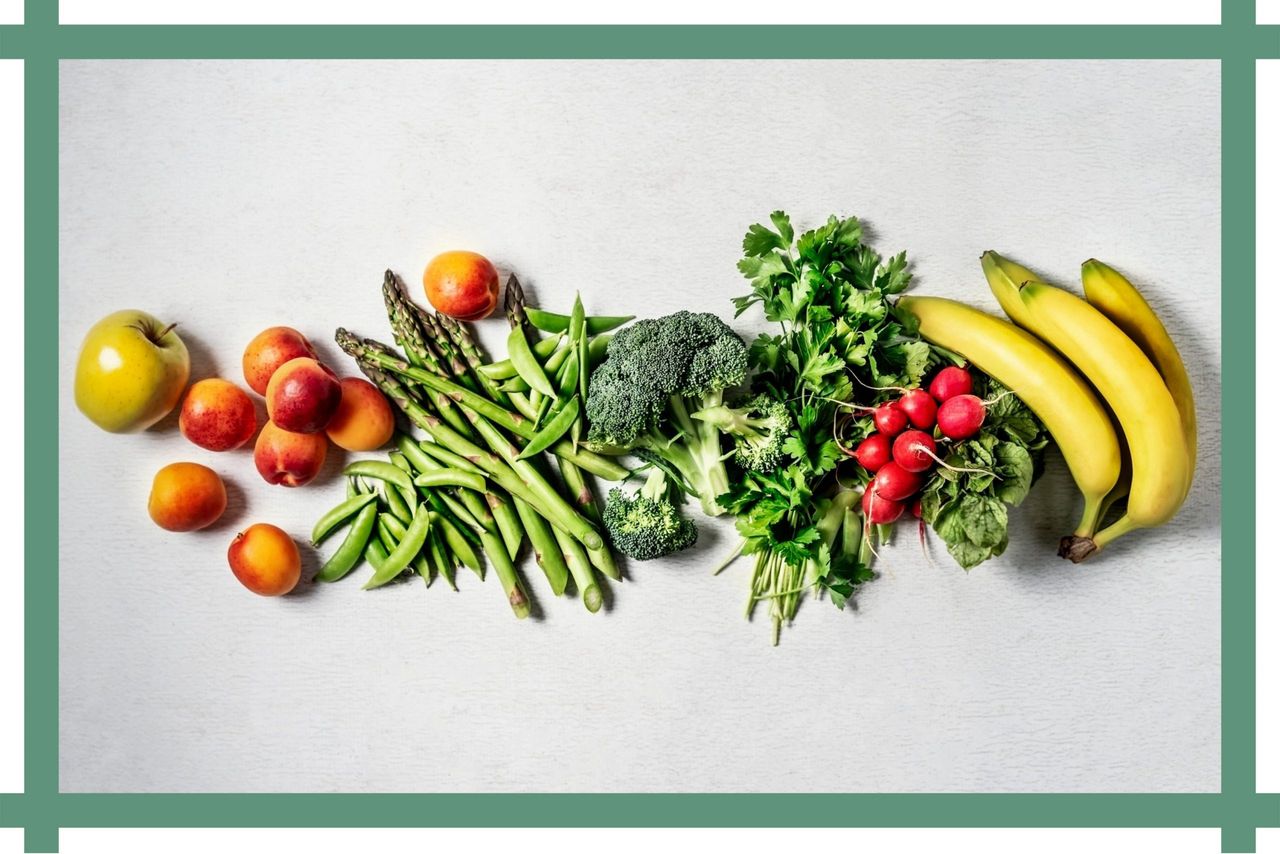

From the freezer to the fridge, keep fruit and veg fresher for longer and save money on food, by following these simple tips and tricks.
Resource efficiency experts WRAP calculate that the average household throws away £60 worth of food every single month. A staggering £1.17bn worth of fruit and veg is wasted every year by Brits, according to new research from Sainsbury’s. The study reveals that the average British household throws away nearly three items a week, or 75.6m as a nation.
A high proportion of which is fresh veggies and salad, with the biggest loss being those dinner table staples, potatoes, and carrots. Bulk buying is a big culprit of this and can often result in us chucking away food – especially fruit and veg – that has spoiled. And, with the cost of living crisis, that will never do. So, storing fruit and veg in the best way possible means it will stay fresher for longer – and you will save money too.
They are plenty of efficient ways to reduce food waste; Learn how to organise your fridge, so food is kept correctly (in the range of 3-5°C) for the highest chance of lasting the longest time possible. Prepare fruit and veg when you're about to eat them to avoid browning or for them to spoil. And of course, making the most of your freezer; "Always wash and dry your fruit and veg thoroughly before freezing," says Kate Hall from The Full Freezer, who helps people stop wasting food.
"And think about how you're going to use it before freezing. Cut veggies into bite-size pieces so they can be cooked straight from frozen. Or freeze pieces on a lined tray before moving them to a freezer bag. This way you don't end up with a solid block of frozen food and you can just use as much as you need." Kate says it's also important to squeeze as much air as possible out of your freezer bags to reduce the risk of freezer burn and ice on your veggies.
How to keep fruit and vegetables fresh
1. How to keep strawberries fresh
Strawberries are one of the top 10 most thrown away fresh foods in the UK, according to research by Tesco. Strawberries are one of the worst culprits for spoiling too swiftly so definitely one for the fridge here. They deteriorate more quickly once they're washed. So avoid rinsing until you're just about to eat them. If you're not planning to eat a whole punnet in one go, leave behind the ones you won't eat for later washing.
Another way to preserve their freshness is to soak them in vinegar (this can work for all other types of berries too – including the dreaded raspberries that seem to go mushy after about ten minutes). Soak them in a bowl in a 1/4 vinegar 1 and a 1/2 water ratio solution. Let them soak for five minutes, give them a good rinse and dry on a paper towel. Line a storage container with more paper towels, pop them in, and ideally stick them back in the fridge.
GoodtoKnow Newsletter
Parenting advice, hot topics, best buys and family finance tips delivered straight to your inbox.
2. How to keep celery fresh
Another fridge dweller, the best way to keep celery fresh is to wrap it tightly in aluminum foil first. Celery produces ethylene gas, which causes it to spoil faster, but the foil will allow the ethylene to escape. A plastic bag, on the other hand, will trap the gas, so yet another reason to ditch it as packaging.
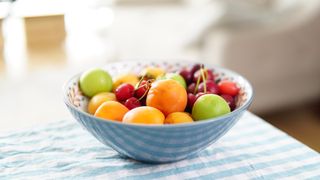
3. How to keep onion fresh
According to WRAP, 970,000 whole onions are wasted every year – and many more partly used ones must end up in the bin, too. An onion's favourite place to live is a cool, dark cupboard. The fridge is too cold and can make them go soft. If you have only used half an onion, the solution (apart from buying smaller onions) is to pop it in the fridge in an airtight container, where it will keep for about a week. They can be frozen too and, unlike other veggies, don't have to be blanched first, according to Kate Hall. Just finely chop before you put it in there, so it will be easier to use than trying to defrost a whole onion.
4. How to store potatoes
One of our most wasted food items – according to new research by Sainsbury’s, we throw away over 17 and a half million potatoes every year. With each household throwing away an average of 13% of the spuds they buy every week. Potatoes can last a really long time if stored correctly. Store them in a bag or box with good ventilation such as a cardboard box or hessian bag. This will allow them to breathe, but also keep them in the dark. Avoid using a plastic bag to store them. Keep them away from onions as this can cause them to over-ripen.
Keep your tatties cold, but not too cold. Ideally, potatoes should be kept at around 10°C. A larder is an ideal place. If you don’t have the luxury of a room dedicated entirely to food, then the garage or a cool dry cupboard is fine. Don’t be tempted to keep potatoes in the fridge as this will turn the starch into sugar and impair the flavour.
You can still eat potatoes that have started growing sprouts, just cut them out, and avoid any that are very soft or shriveled.
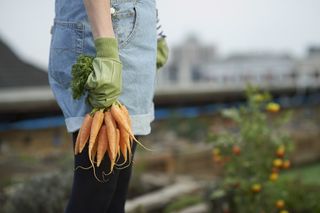
5. How to store carrots
We throw away 2.7 million carrots every day, says the campaigning group Love Food Hate Waste. Carrots are always a bit of a grey area when it comes to storage. As root veg, many of us keep them in the veg box or cupboard alongside the spuds and onions, where they will live happily for a few days. But, for good longevity – up to four weeks – the fridge is the place to be. According to The World Carrot Museum, they should be taken out of plastic to avoid the sweating that leads to mold formation.
Don't be in a rush to scrub or clean them. Pre-cut or peeled carrots spoil far faster than those with skins and a bit of grubbiness about them. They also say you should cut off any leaves before storing them. These will draw the moisture out of the root and, if they are looking a bit shriveled by the time you come to eat, you can perform the life-saving treatment by soaking them in water to revive them.
6. How to store broccoli
A definite priority for taking its rightful fridge space, broccoli will keep for around four days. This can be nicely extended if you spritz the heads with water, or wrap in them a damp paper towel, to keep them moist. And don't be afraid of a little yellowing. It's a sign that it's starting to deteriorate, but it's still perfectly good to eat – though don't leave it too long.
Like most veg, you can freeze it too. "To best preserve, you should blanch first; this involves dunking into boiling water for a few minutes before moving to ice water. This helps to preserve the colour, flavour, and texture and slow down the deterioration of the quality," explains Kate Hall.
7. How to store salad leaves
We throw away a staggering 40% of all the bagged salad we buy every year – which adds up to 178 million bags, according to figures from WRAP. So if you’ve spent £2 on a bag of leaves, that’s 80p down the drain. Whole lettuces last longer than bagged salad (did you know you can even regrow vegetables at home?) but, whatever your leaves of choice, they need to be stored in the fridge. Make sure that they don't get squashed or touch the back of the fridge, where they could freeze and spoil) and, with bags of leaves, transfer any leftovers into a sealable container after opening to stop the leaves wilting.
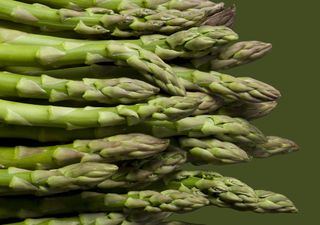
8. How to keep asparagus fresh
Asparagus would like to be stored washed and upright in a glass jar with an inch of water in it, stem side down. If, however, you're lacking in space, wrap it in a damp paper towel instead. Asparagus isn't the longest-lasting of veggies, so it deserves to be treated with care. If the tips are darkening, the stalks may still be edible. If it's gone mushy or smells iffy (and even a little fishy), then its destiny is, sadly, in the bin.
9. How to keep cucumber fresh
A food waste study of 2,000 adults, commissioned by Waitrose, found that cucumbers were the fifth most thrown away food in households. Cucumbers should be in the fridge but they can spoil if they get too cold, so the best location for them is close to the front, furthest from the element. Once they start to wrinkle, they're aging and, if they go slimy on the inside, they'll need to be thrown out.
10. How to store tomatoes
A staggering 733 million tomatoes are being thrown away every year, according to Sainsbury’s survey. And at an average cost of 24p each, that is a terrifying waste of money. So many people get this one wrong. Because they're a salad fruit, it's easy to think they should be in the fridge, but have you tasted the difference between a tomato naturally ripened and one that's been stuck in the fridge? The latter is a foodie travesty. Tomatoes need to stay at room temperature, ideally in a single layer and out of direct sunlight. And, not many people know that to keep them fresher longer, you should store them stem side down.
If tomatoes get over-ripe, there are still plenty of uses for them in sauces and curries. If you really have to put them in the fridge to keep them going longer, make sure you take them out a day or two before eating to attempt to return them to their former glory. However, it's commonly thought that once refrigerated, they'll never be as tasty again.
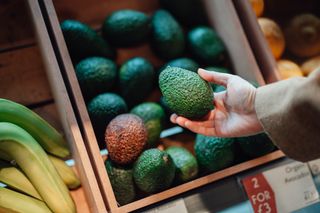
11. How to keep avocados fresh
Around 30% of avocados are wasted each year, according to researchers at Cranfield University. Of all the fruits, avocados need a good ol' squeeze during the purchasing process. They can be everything from rock-solid to overly squidgy. If you've gone for an under-ripe variety, leave it in the fruit bowl to ripen as it needs to be at room temperature. If it's already soft, stick it in the fridge for longevity. Or if you've bought a firm one and don't think you'll want it for quite some time, it could last for up to two weeks in the fridge.
If you like your avo on toast in the morning and it takes you a few days to get through the whole pear, store the leftovers in the fridge after squeezing over some lemon to stop it from going brown. It's worth keeping the seed in too. While it's a myth that it will stop the fruit from going bad, it does protect the area around and underneath where it sits because no oxygen gets to it.
12. How to store blueberries
The Waitrose survey found that blueberries were in the top 20 most thrown away foods in households. Blueberries do seem to last slightly longer than some of their berry relations, but they still need a spot of TLC. Do put them in the fridge. But don't put them in an airtight container, and make sure they have a bit of space to breathe. Pop a piece of paper towel between any layers, and make sure they're dry so they don't go soggy or moldy prematurely. Also, have a rifle through and check for any lurking signs of fur – if you've got a rotten one, chuck it straight out as it's likely to spread and infect its friends.
Like other berries, blueberries can be frozen too. "The most important thing to remember is that frozen fruit generally can't be defrosted and used as if it was fresh. In the case of home frozen fruits, you can even eat the pieces still frozen, or whizz them into ice creams, sorbets, or smoothies," says Kate Hall.
13. How to store lemons and limes
Lemons and limes will last happily for around a week in the fruit bowl. Placed in zip-locked bags in the fridge though, they will last for a few weeks. Cut lemons (because we often just need a squeeze, right?) definitely need to be refrigerated - wrap the cut end in beeswax and a layer of foil, because citrus fruits will dry out once cut.
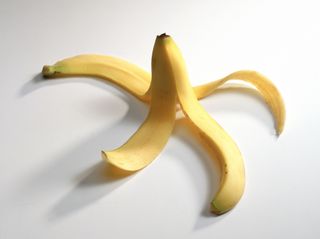
14. How to keep bananas fresh
We are throwing away 1.4 million bananas every year, according to WRAP. We've all been storing our trusty bananas and apples together since the dawn on time. This dear fruit-loving friend is an error. Why you might ask? Well, they both produce a lot of ethylene gas which causes fruits to ripen faster. When stored together, they will quickly spoil. So, if you're bananas are worthy of nothing more than banana bread, this could well be the reason.
And if you've ever thought about the logic of hanging bananas from hooks, it's not purely for decorative purposes. The ethylene gas releases from the stems as soon as they're picked but, if you hang them, the gas does its work at a slower pace. It has a dual purpose, too, as they won't bruise like they might in the rough and tumble of the fruit bowl. It's also worth wrapping the tops in beeswax or foil. This prevents the ethylene gas from ripening the bananas too quickly.
Top tips for keeping fruit and vegetable fresh
- To stop your vegetables from turning brown, soak them in 1 tsp of cider vinegar or lemon juice in about 500ml of cold water.
- Leftover veg that you won't have the opportunity to eat before it goes bad, transform them into something with a longer shelf life. Pickles and preserves are a great idea to save fruit and veg from the bin.
- To ripen fruit, particularly the like of avocados, pears, and mangoes that can often be hard when we first buy them, it’s best to leave them out of the fridge, but pop them into the cool for longevity when they're getting too soft.
- To stop fruit from turning brown, coat it in a juice high in antioxidants, such as lemon, lime, or pineapple.
- Remember peeling and cutting the fruit in advance can be detrimental to flavour and nutritional value because – here comes the science bit – as soon as fruits and vegetables are cut into, they're exposed to oxygen and light which causes the vitamins to break down. Some, like apples and avocados, oxidise rapidly and turn brown because the enzymes inside are being exposed to and reacting with oxygen in the air. The same goes for potatoes too.
Video of the week

Lara Kilner is a writer and editor with two decades of experience in national newspapers, magazines, and websites. She writes about food, lifestyle, travel, health and wellness, and entertainment, and regularly interviews celebrities and people with interesting life stories and experiences. Her foodie content has included interviews with Jamie Oliver, Rick Stein, Queer Eye’s food expert Antoni Porowski, the Hairy Bikers, Hugh Fearnley Whittingstall, Raymond Blanc, Andi Oliver, Paul Hollywood, Prue Leith, and Nadiya Hussain.
-
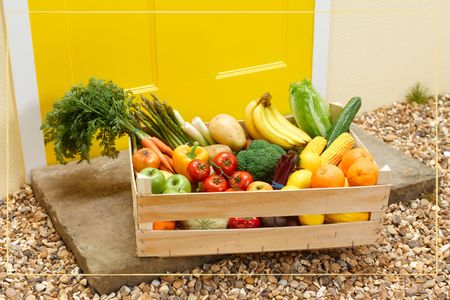 Ocado's incredible Fill Your Freezer deal for families will slash £'s off your food shopping bills
Ocado's incredible Fill Your Freezer deal for families will slash £'s off your food shopping billsThe supermarket is offering five items for £10 across its frozen desserts, ready meals, fruit and vegetables.
By Selina Maycock Published
-
 Cheap family meals: 25 budget dinners every parent needs to know about (and they're all under £2 a head)
Cheap family meals: 25 budget dinners every parent needs to know about (and they're all under £2 a head)Casserole, pasta bakes, and more; save money with these cheap family meals - perfect for those on a budget...
By Octavia Lillywhite Last updated
-
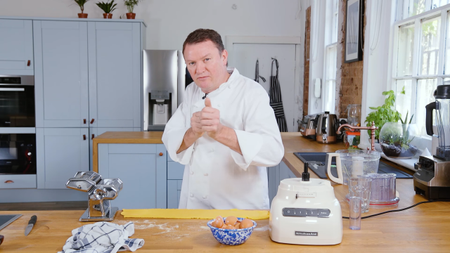 How to make fresh pasta with Theo Randall
How to make fresh pasta with Theo RandallLearn how to make homemade pasta using celebrity chef Theo Randall's signature recipe...
By Keiron George Published
-
 22 money-saving store cupboard meals using tinned or packet ingredients
22 money-saving store cupboard meals using tinned or packet ingredientsMoney-saving recipe ideas using ingredients from your kitchen cupboard - quick, easy and cheap
By Lara Kilner Last updated
-
 Freezer meals: Money-saving recipes to make in bulk
Freezer meals: Money-saving recipes to make in bulkSave time and money with these family-friendly freezer meals - just perfect for bulk cooking...
By Lara Kilner Last updated
-
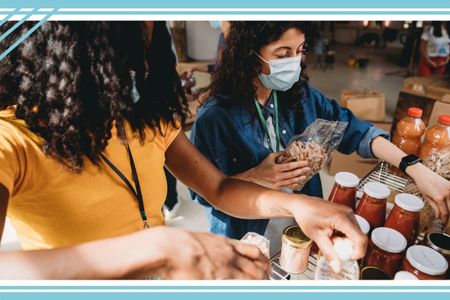 Local food banks: Food banks near me and how to get a food bank referral
Local food banks: Food banks near me and how to get a food bank referralThe easiest ways to find a local food bank near you - and how to seek additional support
By Jessica Dady Published
-
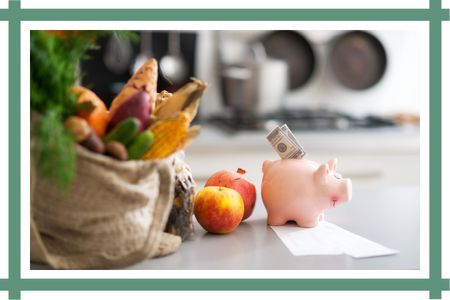 Food hacks: 23 clever tips and tricks to save money
Food hacks: 23 clever tips and tricks to save moneyMake the most out of your food shop with these nifty food hacks, tips, and tricks. From peeling ginger so there's no waste, to using leftovers...
By Lara Kilner Last updated
-
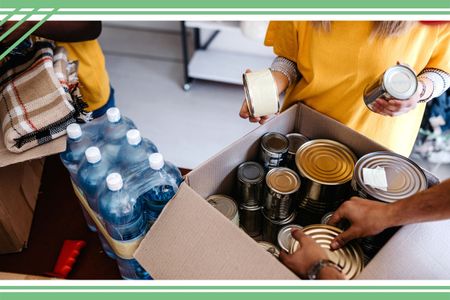 How to donate to a food bank - and food bank donations near me
How to donate to a food bank - and food bank donations near meBy Jessica Dady Last updated